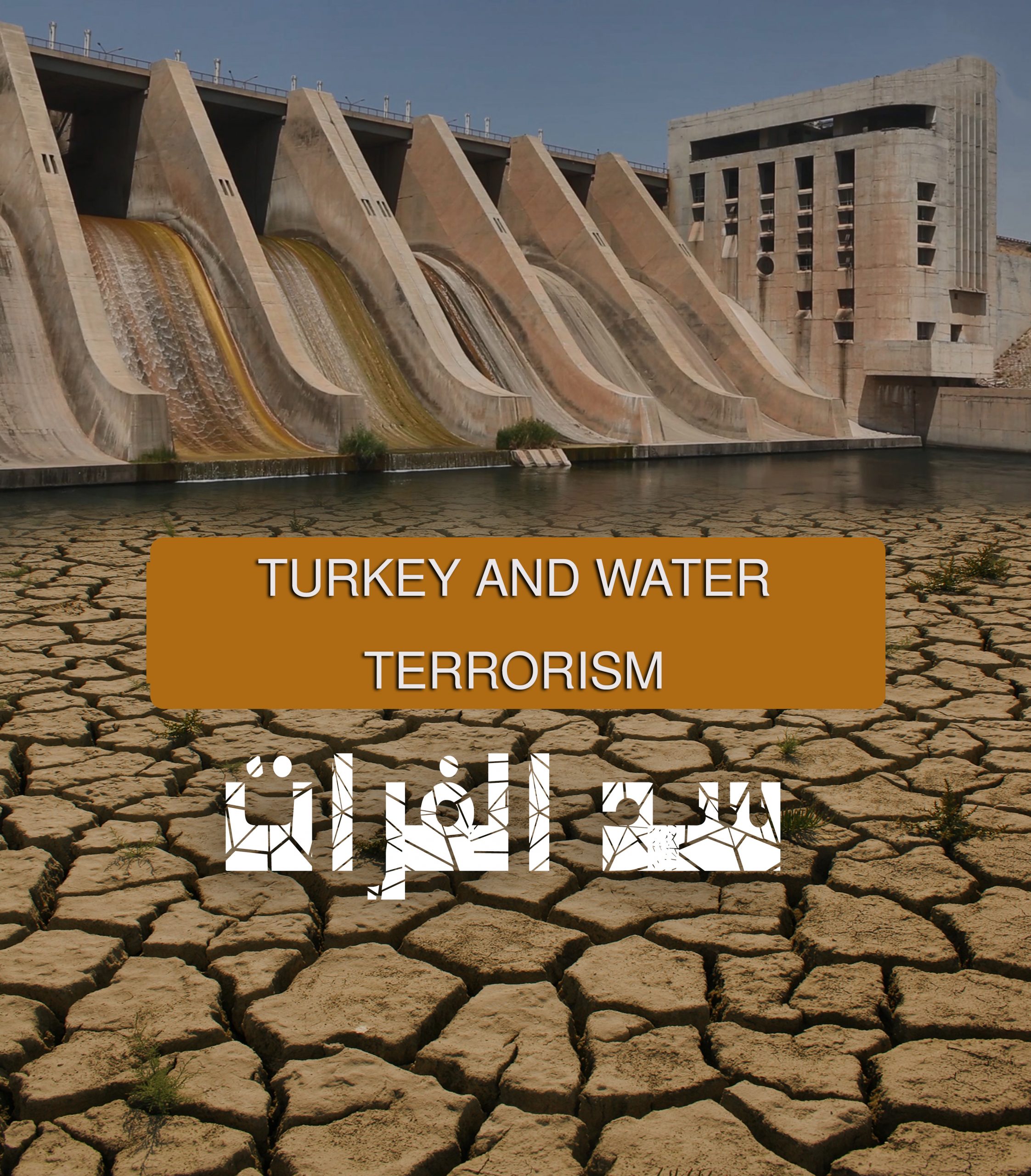Turkey and water terrorism The Euphrates Dam

Since January 27, the Turkish occupation state started seizing huge quantities, about 80%, of the water of the Euphrates River, after Ankara built dams and projects on the banks of the Tigris and Euphrates in the previous years to control water resources and impose its sovereignty over the neighboring border areas, especially Syria and Iraq, using water as a weapon against the peoples of those countries, which posed a real threat to human, environmental and economic life, especially since the Euphrates River level fell to 20%.
Water war against north and east Syria’s peoples
Turkey is launching a war of another kind, which is a “water war” against the regions of northern Syria, especially by adopting the policy of thirst, control and manipulation of the streams of the Euphrates and Tigris, as a tool of war which is the most deadly for the peoples of the region. Turkey has stored huge quantities of water in the dams it has built, especially the Ilisu Dam, which led to a decrease in the water flowing into Syria, and thus the river’s water level decreased dramatically, and reached the point of drought.
Building the Ilisu Dam has led the level of the Tigris River, which passes through the Syrian lands, to decrease. This decrease negatively affected the agricultural areas in the far northeastern Syria, which depend on the water of the Tigris River for the irrigation of agricultural lands.
The manipulation of the water level of the Euphrates River during this year led to a shortage of water reserves by 2-3 cm, and the level of the river decreased at a rate of 4 cm per day, which is spent on generating power, and more than 1 cm per day is spent on irrigation, which is about 80%. So that the total daily consumption reaches an average of 5 cm per day, and if the situation continues as it is, the depth of the decline within a month will reach 1.5 meters per day, that is, the level of the Euphrates Lake will reach about 300 meters, and this is a difficult level to consume in generating power.
This poses serious risks to life, and it constitutes a real threat to the societal economy and food security of the region’s population. Thus, the region is facing an imminent humanitarian and environmental disaster as a result of the low level of the Euphrates to less than a quarter of the quantity.
Signs of these risks started to appear, as the number of the hours of power generating was reduced in all regions such as in the cities of Manbij, Kobani, Deir al-Zour and Hasakah due to the stoppage of the work of the power generating turbines in Tishrin dam, in the countryside of Aleppo, and the Euphrates dam in the countryside of Raqqa.
Regarding the matter, co-chair of the Energy and Communication Office in the Jazira region, Ahin Suwed, said that the decrease in water supplies of the Euphrates about a month ago, caused a significant decrease in the water level in the three dams on the river. This affected the process of power generating in northeast Syria, and is considered “a violation against humanity, and it is a war crime,” as it puts the region in front of a serious epidemic situation.
Syria’s share of water decreased to a quarter
The decline in the water level has not only affected the regions of northern Syria, but also Syria in general, as more than a third of the country depends on the level of the Euphrates and Tigris rivers regarding power generating. The Euphrates Dam produces about 800 megawatts of power per hour, but the rate of production has decreased to less than a quarter in Syria in the recent period.
Thus, the Turkish state has violated the agreements of the Euphrates River signed between Syria and Turkey in 1987, according to which Syria’s share 500 cubic meters per second, which is about 42%. So that Syria’s share of the Euphrates water will be 6,627 billion cubic meters. In order to guarantee Syria’s right to obtain its share of water, this agreement was registered in the United Nations.
However, in light of Ankara’s seizure of huge amounts of water, Syria’s share decreased from 500 to nearly 200 cubic meters per second, which is a violation of the agreement signed between the two countries.
Iraq is no different from Syria
Building Ilisu Dam in Turkey has exposed the lives of millions of Syrians and Iraqis to catastrophic risks.
Ilisu has damaged the economic and food resources in Mosul, Sulaymaniyah, Baghdad, Amara and Basra in Iraq, and it is possible that the course of the Tigris River will turn into a small river, in addition to the threat of desertification, according to media reports.
The water and geopolitical expert, Abdullah Al-Ahmad held Turkey responsible for this, confirming that “Turkey is using water as a tool of war against Syria and Iraq, and this is contrary to international law, stressing that the international agreements stress the need to take into account the water needs of the neighboring countries on the Tigris and Euphrates bank. In this case, Turkey is prohibited from taking any action that would harm those countries, that is, Syria and Iraq.”
During this year, Iraq lost about 50% of its water resources because of the Turkish dams, according to the Iraqi Minister of Water Resources, Mehdi al-Hamdani. By this, Ankara has violated the agreement signed with Iraq regarding supplying the region with water, since the two countries signed an agreement in 1989 to distribute water, where Iraq’s is 9,106 billion cubic meters, that is 58% of the Euphrates water, according to the agreement.




